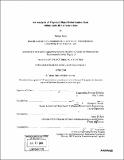An analysis of physical object information flow within Auto-ID infrastructure
Author(s)
Inaba, Tatsuya, 1967-
DownloadFull printable version (4.642Mb)
Other Contributors
Massachusetts Institute of Technology. Engineering Systems Division.
Advisor
George A. Kocur.
Terms of use
Metadata
Show full item recordAbstract
The application of Radio Frequency Identification (RFID) has been studied for decades, and many field trials have been executed to evaluate the usability of RFID systems, the business case of RFID applications and so forth. One of the trial fields is its application to supply chain management (SCM) because the RFID technologies are thought to improve visibility of physical objects dramatically. Through this trial phase, benefits and feasibility of RFID have been confirmed, and as a result, major retailers, such as Wal-Mart, Target, and Metro, have decided to implement RFID. At the same time, these trials reveal the necessity of RFID standards. Among these newly developed RFID standards, Auto-ID standard, which was originally developed by Auto-ID Center, is a strong candidate to be a de-facto standard. Auto-ID technologies consist of data standards and software architecture components. Data standards also consist of two components: Electronic Product Code (EPC) and Physical Markup Language (PML). On the other hand, software architecture components consist of four components: readers, Savant, EPC Information Server (EPC-IS), and Object Name Service (ONS). EPC-IS. which defines the interface of the servers that store physical object information, plays a key role in realizing business processes that the RFID technologies are expected to realize. In this thesis, we propose architecture of EPC-IS by defining the requirements for EPC-IS through generic business processes executed in Auto-ID infrastructure. The architecture we propose is not a monolithic message schema but three simple message schemas with vocabulary sets that are separately defined in dictionaries. By taking this structure, we achieve robust and scalable interface. We also evaluate our proposal by applying it to the problems found in the RFID trials and possible future business processes.
Description
Thesis (M. Eng. in Logistics)--Massachusetts Institute of Technology, Engineering Systems Division, 2004. "June 2004." Includes bibliographical references (leaves 69-71).
Date issued
2004Department
Massachusetts Institute of Technology. Engineering Systems DivisionPublisher
Massachusetts Institute of Technology
Keywords
Engineering Systems Division.